【弯道超车】Unit 3 Family life 核心语法之动名词作主语或宾语-2025年沪教牛津版九年级英语上册精讲精练 (含答案解析)
文档属性
| 名称 | 【弯道超车】Unit 3 Family life 核心语法之动名词作主语或宾语-2025年沪教牛津版九年级英语上册精讲精练 (含答案解析) |
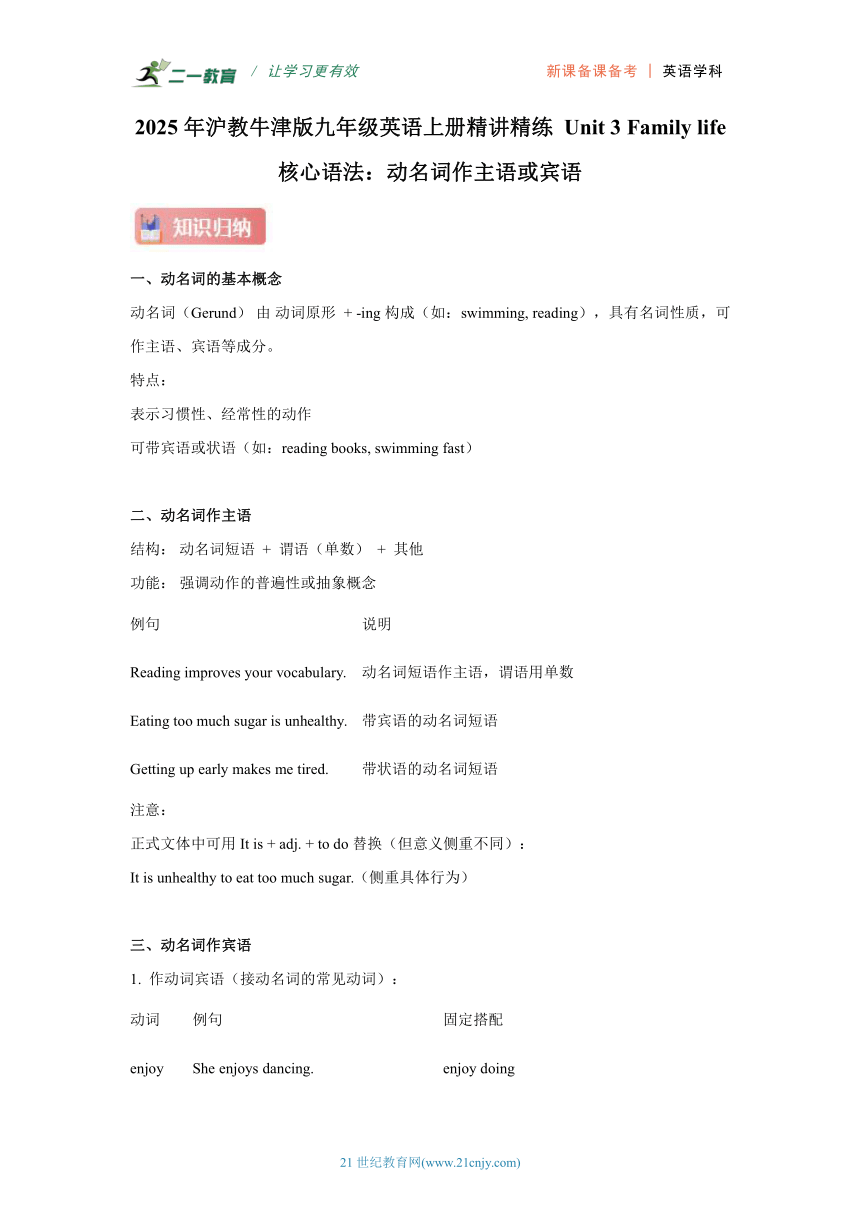
|
|
| 格式 | docx | ||
| 文件大小 | 66.7KB | ||
| 资源类型 | 试卷 | ||
| 版本资源 | 牛津深圳版 | ||
| 科目 | 英语 | ||
| 更新时间 | 2025-07-16 18:02:49 | ||
图片预览

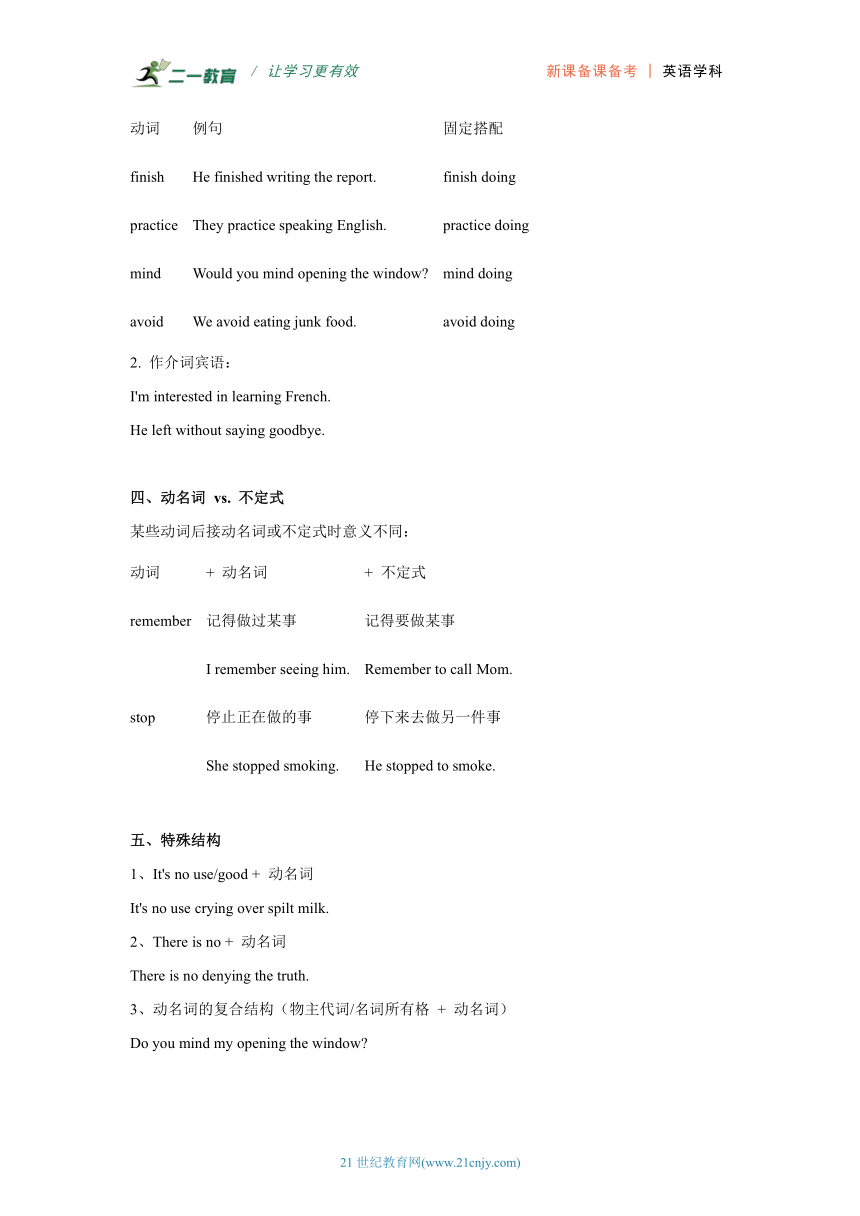
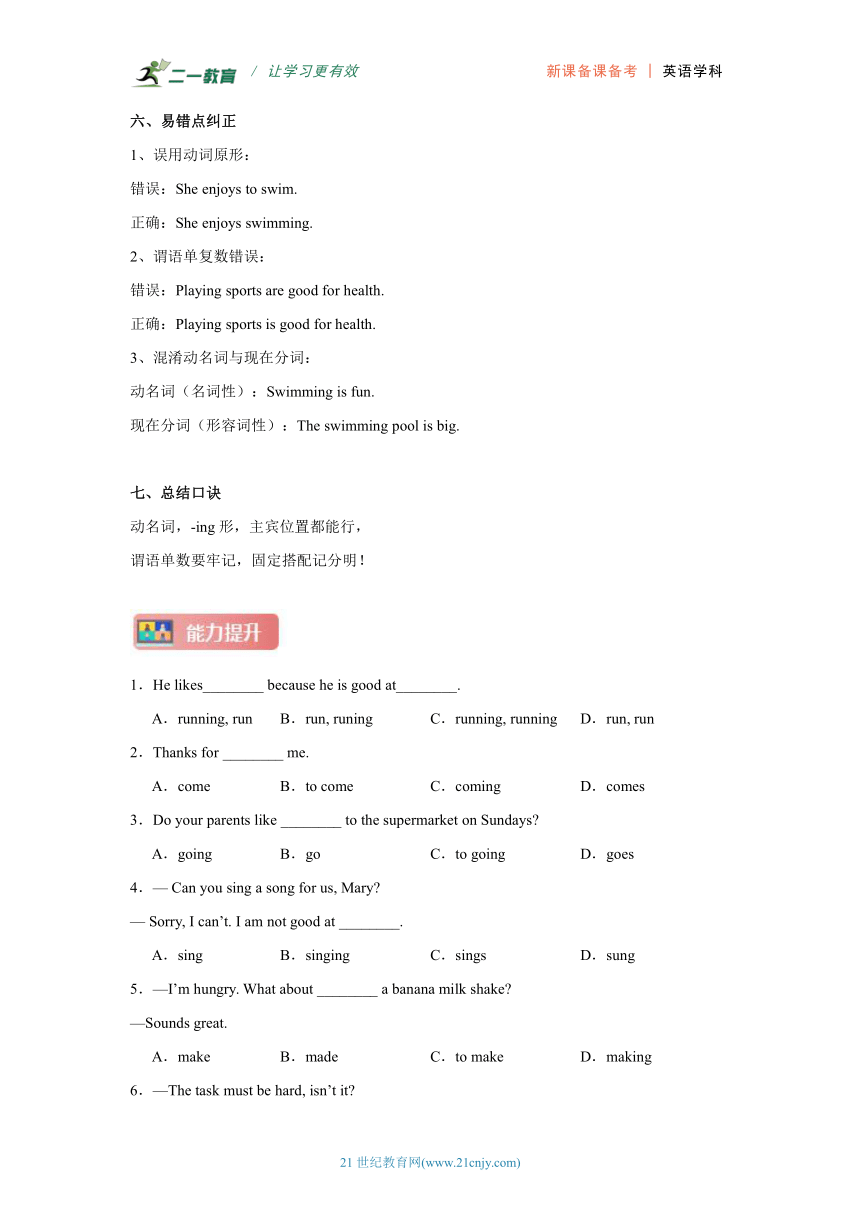
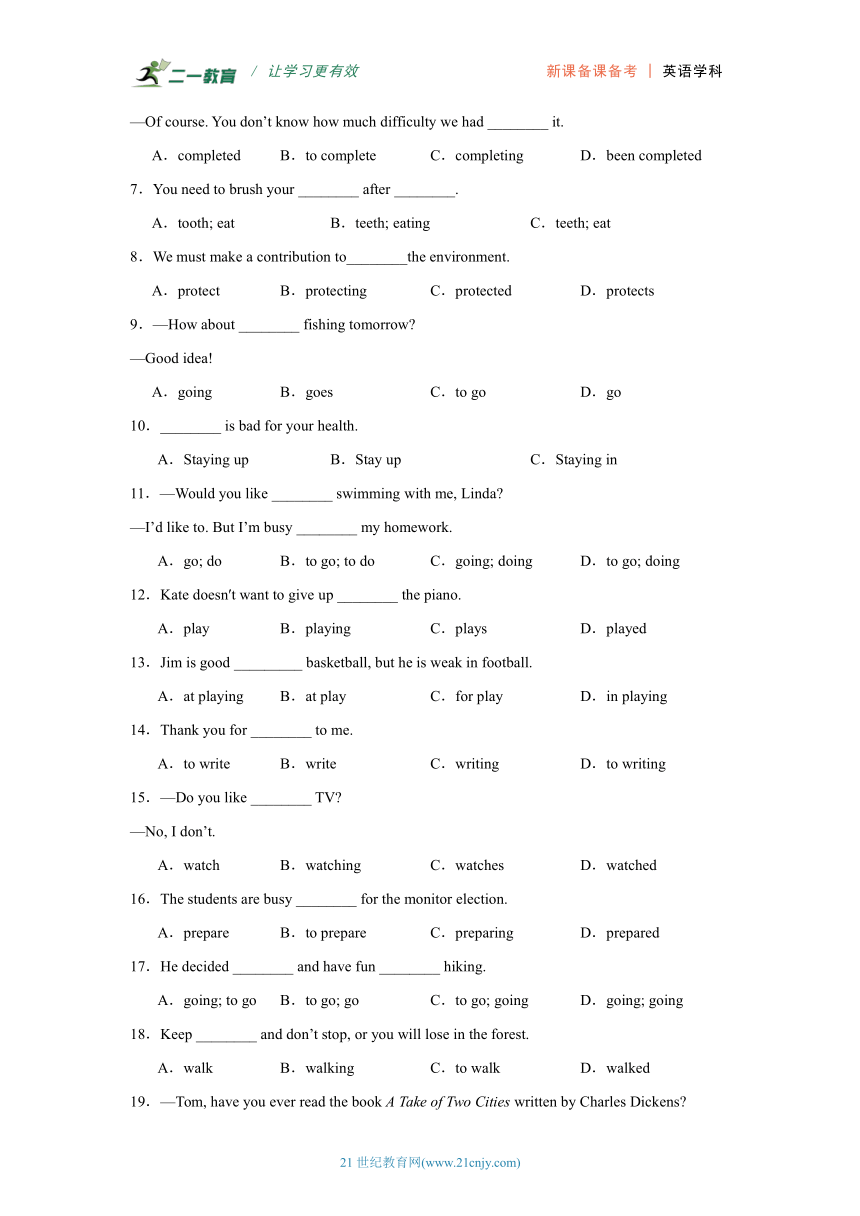
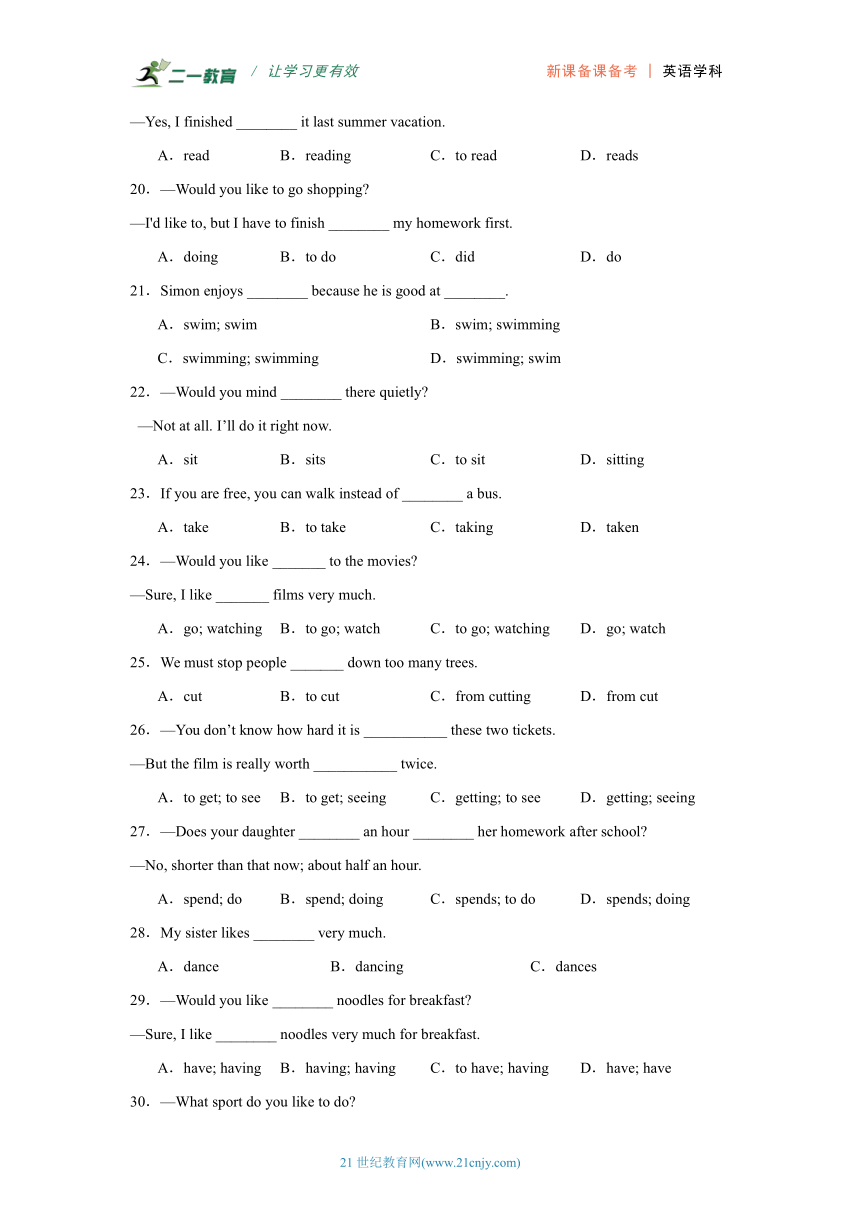
文档简介
/ 让学习更有效 新课备课备考 | 英语学科
/ 让学习更有效 新课备课备考 | 英语学科
2025年沪教牛津版九年级英语上册精讲精练 Unit 3 Family life
核心语法:动名词作主语或宾语
一、动名词的基本概念
动名词(Gerund) 由 动词原形 + -ing 构成(如:swimming, reading),具有名词性质,可作主语、宾语等成分。
特点:
表示习惯性、经常性的动作
可带宾语或状语(如:reading books, swimming fast)
二、动名词作主语
结构: 动名词短语 + 谓语(单数) + 其他
功能: 强调动作的普遍性或抽象概念
例句 说明
Reading improves your vocabulary. 动名词短语作主语,谓语用单数
Eating too much sugar is unhealthy. 带宾语的动名词短语
Getting up early makes me tired. 带状语的动名词短语
注意:
正式文体中可用 It is + adj. + to do 替换(但意义侧重不同):
It is unhealthy to eat too much sugar.(侧重具体行为)
三、动名词作宾语
1. 作动词宾语(接动名词的常见动词):
动词 例句 固定搭配
enjoy She enjoys dancing. enjoy doing
finish He finished writing the report. finish doing
practice They practice speaking English. practice doing
mind Would you mind opening the window mind doing
avoid We avoid eating junk food. avoid doing
2. 作介词宾语:
I'm interested in learning French.
He left without saying goodbye.
四、动名词 vs. 不定式
某些动词后接动名词或不定式时意义不同:
动词 + 动名词 + 不定式
remember 记得做过某事 记得要做某事
I remember seeing him. Remember to call Mom.
stop 停止正在做的事 停下来去做另一件事
She stopped smoking. He stopped to smoke.
五、特殊结构
1、It's no use/good + 动名词
It's no use crying over spilt milk.
2、There is no + 动名词
There is no denying the truth.
3、动名词的复合结构(物主代词/名词所有格 + 动名词)
Do you mind my opening the window
六、易错点纠正
1、误用动词原形:
错误:She enjoys to swim.
正确:She enjoys swimming.
2、谓语单复数错误:
错误:Playing sports are good for health.
正确:Playing sports is good for health.
3、混淆动名词与现在分词:
动名词(名词性):Swimming is fun.
现在分词(形容词性):The swimming pool is big.
七、总结口诀
动名词,-ing形,主宾位置都能行,
谓语单数要牢记,固定搭配记分明!
1.He likes________ because he is good at________.
A.running, run B.run, runing C.running, running D.run, run
2.Thanks for ________ me.
A.come B.to come C.coming D.comes
3.Do your parents like ________ to the supermarket on Sundays
A.going B.go C.to going D.goes
4.— Can you sing a song for us, Mary
— Sorry, I can’t. I am not good at ________.
A.sing B.singing C.sings D.sung
5.—I’m hungry. What about ________ a banana milk shake
—Sounds great.
A.make B.made C.to make D.making
6.—The task must be hard, isn’t it
—Of course. You don’t know how much difficulty we had ________ it.
A.completed B.to complete C.completing D.been completed
7.You need to brush your ________ after ________.
A.tooth; eat B.teeth; eating C.teeth; eat
8.We must make a contribution to________the environment.
A.protect B.protecting C.protected D.protects
9.—How about ________ fishing tomorrow
—Good idea!
A.going B.goes C.to go D.go
10.________ is bad for your health.
A.Staying up B.Stay up C.Staying in
11.—Would you like ________ swimming with me, Linda
—I’d like to. But I’m busy ________ my homework.
A.go; do B.to go; to do C.going; doing D.to go; doing
12.Kate doesn′t want to give up ________ the piano.
A.play B.playing C.plays D.played
13.Jim is good _________ basketball, but he is weak in football.
A.at playing B.at play C.for play D.in playing
14.Thank you for ________ to me.
A.to write B.write C.writing D.to writing
15.—Do you like ________ TV
—No, I don’t.
A.watch B.watching C.watches D.watched
16.The students are busy ________ for the monitor election.
A.prepare B.to prepare C.preparing D.prepared
17.He decided ________ and have fun ________ hiking.
A.going; to go B.to go; go C.to go; going D.going; going
18.Keep ________ and don’t stop, or you will lose in the forest.
A.walk B.walking C.to walk D.walked
19.—Tom, have you ever read the book A Take of Two Cities written by Charles Dickens
—Yes, I finished ________ it last summer vacation.
A.read B.reading C.to read D.reads
20.—Would you like to go shopping
—I'd like to, but I have to finish ________ my homework first.
A.doing B.to do C.did D.do
21.Simon enjoys ________ because he is good at ________.
A.swim; swim B.swim; swimming
C.swimming; swimming D.swimming; swim
22.—Would you mind ________ there quietly
—Not at all. I’ll do it right now.
A.sit B.sits C.to sit D.sitting
23.If you are free, you can walk instead of ________ a bus.
A.take B.to take C.taking D.taken
24.—Would you like _______ to the movies
—Sure, I like _______ films very much.
A.go; watching B.to go; watch C.to go; watching D.go; watch
25.We must stop people _______ down too many trees.
A.cut B.to cut C.from cutting D.from cut
26.—You don’t know how hard it is ___________ these two tickets.
—But the film is really worth ___________ twice.
A.to get; to see B.to get; seeing C.getting; to see D.getting; seeing
27.—Does your daughter ________ an hour ________ her homework after school
—No, shorter than that now; about half an hour.
A.spend; do B.spend; doing C.spends; to do D.spends; doing
28.My sister likes ________ very much.
A.dance B.dancing C.dances
29.—Would you like ________ noodles for breakfast
—Sure, I like ________ noodles very much for breakfast.
A.have; having B.having; having C.to have; having D.have; have
30.—What sport do you like to do
—I like ________.
A.run B.runs C.running D.ran
31.I’m looking forward to ________ my new classmates.
A.meet B.meeting C.met D.meets
32.—How about ________ dinner at home
—________.
A.to make; Sounds fun B.make; I don’t know
C.making; Good idea D.makes; Come on
33.You must keep ________ hard if you want to get good grades.
A.study B.studying C.to study D.to studying
34.—What about ________ dinner with me
—Good idea.
A.has B.have C.to have D.having
35.I think ________ with my classmates can improve my English.
A.discuss B.discussing C.to discuss D.discussed
36.They insisted on ________ another chance to try.
A.got B.getting C.being got D.to be got
37.Don’t go ________ today. There are too many people in the pool.
A.shopping B.shop C.swimming D.swim
38.—Mary, today is Saturday. How about _______ shopping
—Good idea.
A.go B.to go C.going D.will go
39.They are interested in ________ model planes.
A.make B.making C.made D.to make
40.—Would you like ________ noodles for breakfast
—Sure. I like ________ noodles very much for breakfast.
A.have; having B.having; having C.to have; having D.to have; have
41.All the students stopped ________ when the teacher came in.
A.talk B.to talk C.talking D.talked
42.My mother is busy _________ the house for the coming guests.
A.clean B.to clean C.cleaning D.cleaned
43.I used to ________ a bus to school. But now I get used to ________ a bike.
A.take; ride B.taking; ride C.take; riding D.taking; riding
44.— Why are the boys practicing _______ basketball in such bad weather
—Because there _______ a basketball game tomorrow.
A.to play; will be B.playing; is going to be C.to play; are going to be D.playing; will have
45.—I heard that the movie Wolf Warrior II was exciting. How about _______ it tonight
—Sounds great!
A.watch B.to watch C.watched D.watching
46.Bob has trouble ________ the word. That means he can’t get the ________ right.
A.pronouncing; pronunciation B.pronunciation; pronounce C.pronouncing; pronounce
47.Although it’s late, he still keeps on ________ his homework.
A.does B.do C.doing D.did
48.I think the environment is really important. ________, I like ________ my bike.
A.Beside; riding B.Besides; riding C.Except; to ride D.Except; riding
49.—________ a bike to school is good for your health.
—Sure, and it is also good for our environment.
A.To riding B.Ride C.For riding D.Riding
50.—Do you still remember ________ me somewhere in Shanghai
—Yes, of course. Two years ago.
A.see B.to see C.seeing D.saw
51.—My father often stops me from ________ in the river alone.
—He’s right. It’s too dangerous.
A.swim B.swims C.swimming D.swam
52.Sandy is good at _________. She can ________ very well.
A.dance; dance B.dancing; dance C.dance; dancing
53.—Anna, you speak English well.
—Thank you. I practice ______ it for half an hour every morning.
A.speak B.speaks C.to speak D.speaking
54.Most of us enjoy __________ to our mothers speak, because our brains greatly prefer the voices of our own mothers.
A.listening B.listen C.to listen
55.People often saw the singer practice ________ songs near the woods three years ago.
A.sing B.singing C.to sing D.sang
56.She spent fifty yuan ________ this book. She spends an hour ________ it every day.
A.on; reading B.on; to read C.in; reading D.for; read
57.I think English learners should pay more attention ________ grammar.
A.learning B.to learning C.to learn
58.I like ________ music very much.
A.listen to B.listening to C.hear D.hearing
59.Diana used to ________ to work, but now she is used to ________ because the road is crowded and she wants to keep fit.
A.drive; walk B.drive; walking C.driving; walk D.driving; walking
60.You’d better keep ________ exercise to keep ________.
A.to do; health B.doing; health C.to do; healthy D.doing; healthy
61.Maria used to ________ late. But now she is used to ________ early.
A.getting up; get up B.get up; get up
C.get up; getting up D.getting up; getting up
62.Lily has a stomachache. She doesn’t feel like______ anything.
A.eat B.eats C.eating D.to eat
63.Bill played football instead of ________ to the movies yesterday afternoon.
A.going B.to go C.go D.went
64.Thanks ________ me to your party.
A.asked B.asks C.for asking D.to ask
65.Shanghai has already succeeded _________ the World Expo in 2010.
A.to hold B.held C.in holding D.hold
66.We will succeed in _________ the financial crisis (金融危机)if we work harder.
A.pass B.passing C.passed D.to pass
67.Imagine ________ the piano on the grass, and the birds are singing and the butterflies are dancing!
A.play B.plays C.to play D.playing
68.Our teachers advise us at least one hour exercise every day to keep healthy.
A.to spend; to take B.to spend; taking
C.spending; to take D.spending; taking
69.—Would you mind ________ here
—I’m sorry about that. I’ll go somewhere else.
A.smoke B.not to smoke C.smoking D.not smoking
70.We should practice __________ English with foreigners if possible.
A.speak B.to speak C.speaking D.spoken
71.He practices ________ football every day, because he is going to be a football player.
A.plays B.played C.playing D.play
72.I had great fun dinner with my friends.
A.eat B.eating C.eats D.ate
73.—Would you mind my _______ your computer. Mine can’t work.
—Go ahead. You can use it anytime.
A.to use B.use C.useing D.using
74.Lily forgot ________ me about it. She did tell me that yesterday.
A.telling B.tell C.to tell D.told
75.My parents are my best listeners. Whenever I feel like ________, they are ready to listen.
A.talk B.to talk C.talking D.to talking
76.She enjoys ________ to parties.
A.go B.going C.go to D.to go
77.It’ll be much fun ______ TV at home, but I always have lots of fun ______ sports in my free time.
A.to watch; to play
B.watching; to play
C.to watch; playing
D.watching; playing
78.I am looking forward to ________ my cousin. He will call me if he ________ in Beijing.
A.seeing; will arrive B.seeing; arrives C.see; will arrive D.see; arrives
79.________ vegetables and fruit ________ good for us.
A.Eat; is B.Eating; are C.Has; is D.Eating; is
80.The girl is often heard ________ in the music room. Her voice sounds beautiful.
A.practice singing B.practiced singing C.to practice singing D.to practice sing
/ 让学习更有效 新课备课备考 | 英语学科
/ 让学习更有效 新课备课备考 | 英语学科
21世纪教育网(www.21cnjy.com)
21世纪教育网(www.21cnjy.com)
参考答案及试题解析
1.C
【解析】句意:他喜欢跑步,因为他擅长跑步。
考查非谓语动词。run是动词原形,意为“跑步”,running是其动名词形式。like doing sth.意为“喜欢做某事”。be good at意为“擅长……”,at是介词,后接动名词作宾语。故选C。
2.C
【解析】句意:谢谢你来看我。
考查动名词作宾语。Thanks for (doing) sth“感谢做某事”,使用动名词作宾语,故选C。
3.A
【解析】句意:你父母喜欢星期天去超市吗?
考查固定搭配。like doing喜爱做某事(经常性的),故选A。
4.B
【解析】句意:——玛丽,你能为我们唱首歌吗?——对不起,我不能。我不擅长唱歌。
考查非谓语动词。be good at doing sth.为固定搭配,意为“擅长做某事”,符合句意,故选B。
5.D
【解析】句意:——我饿了,做点香蕉奶昔怎么样?——听起来不错。
考查非谓语动词。What about ... 意为“……怎么样?”,后跟动名词形式,用于提建议。故选D。
6.C
【解析】句意:——这个任务肯定很难,不是吗?——当然难了。你不知道我们克服了多少困难。
考查非谓语动词。completed完成,过去式或过去分词;to complete动词不定式;completing动名词;had been completed过去完成时。这里是固定词组,have difficulty (in) doing sth表示“做某事有难度”,后跟动名词,故选C。
7.B
【解析】句意:你饭后需要刷牙。
考查可数名词复数及介词用法。brush one’s teeth“刷牙”;介词after后接动名词eating作宾语。故选B。
8.B
【解析】句意:我们必须对保护环境做出贡献。
考查短语介词的用法。根据固定用法“make a contribution to doing sth.”为做某事作出贡献。故选B。
9.A
【解析】句意:——明天去钓鱼怎么样?——好主意!
考查how about的用法。how about doing sth.“做某事怎样”,是固定表达,空处应是going。故选A。
10.A
【解析】句意:熬夜对你的身体不好。
考查非谓语动词。动词作句子主语时,需用doing或to do。stay up熬夜;stay in待在家。根据“is bad for your health.”可知应该是熬夜。故选A。
11.D
【解析】句意:——你愿意和我一起去游泳吗,琳达?——我想去。但我忙着做作业。
考查非谓语动词。would like to do sth.意为“想要做某事”,为固定搭配,故第一空用to go,排除A、C项;be busy doing sth.意为“忙于做某事”,为固定搭配,故第二空用doing,排除B项。故选D。
12.B
【解析】句意:凯特不想放弃弹钢琴。
考查非谓语动词。固定搭配:give up doing sth.放弃做某事。可知这里应该用动名词playing作宾语。故选B。
13.A
【解析】句意:吉姆擅长打篮球,但他足球踢得不好。
考查介词短语辨析。be good at doing sth.擅长做某事,固定搭配,at是介词,后面需接动名词形式。play basketball打篮球,固定短语,play需用其动名词playing形式。故选A。
14.C
【解析】句意:谢谢你给我写信。
考查非谓语动词。Thank you for…意为“因……而感谢你”,for是介词,其后应接名词、代词或动名词作宾语。因此,此处应用writing作介词for的宾语。故选C。
15.B
【解析】句意:——你喜欢看电视吗?——不,我不喜欢。
考查非谓语动词。固定短语like doing sth“喜欢做某事”。故选B。
16.C
【解析】句意:学生们正忙着准备班长选举。
考查非谓语动词。prepare准备,动词原形;to prepare动词不定式;preparing动名词或现在分词;prepared过去式或过去分词。be busy doing sth.为固定搭配,意为“忙于做某事”,所以此处应用preparing。故选C。
17.C
【解析】句意:他决定去高兴地远足。
考查非谓语动词。decide to do sth.“决定做某事”,固定词组;have fun doing sth.“享受做某事的乐趣”,固定词组。故选C。
18.B
【解析】句意:一直走,别停下来,否则你会在森林里迷路的。
考查非谓语动词。walk动词原形;walking动名词形式;to walk动词不定式;walked动词过去式。keep doing sth.“一直干某事”,固定用法。故选B。
19.B
【解析】句意:——Tom,你读过查尔斯·狄更斯写的《双城记》吗?——是的,去年暑假我读完了。
考查非谓语动词。finish doing sth“结束做某事”,使用动名词作宾语,故选B。
20.A
【解析】句意:——你想去购物吗?——我想去,但是我必须先完成作业。
考查非谓语动词。固定搭配:finish doing sth“完成做某事”,动名词作宾语,故选A。
21.C
【解析】句意:西蒙喜欢游泳,因为他擅长游泳。
考查动名词。swim游泳,动词原形;swimming游泳,动名词。结合固定搭配“enjoy doing sth喜欢做某事”和“be good at doing sth擅长做某事”可知,这两个空都填动名词。故选C。
22.D
【解析】句意:——你介意安静地坐在那里吗 ——不介意,我现在就安静地坐着。
考查非谓语动词。mind doing sth.意为“介意做某事”,动名词作宾语,结合句意,故选D。
23.C
【解析】句意:如果你有空,你可以步行而不是乘坐公共汽车。
考查固定搭配。根据介词短语“instead of doing sth.”可知,此空应选择动名词作宾语。故选C。
24.C
【解析】句意:——你想去看电影吗?——当然,我非常喜欢看电影。
考查非谓语动词。would like to do sth.“想做某事”,like doing sth.“喜欢做某事”,是固定词组。故选C。
25.C
【解析】句意:我们必须阻止人们砍伐太多树木。
考查动名词的用法。短语stop sb. (from) doing sth.意为 “阻止某人做某事”。stop people from cutting down too many trees.表示“阻止人们砍伐太多树木”。故选C。
26.B
【解析】句意:——你不知道买这两张票有多难。——但这部电影真的值得看两遍。
考查非谓语动词。it is+adj. to do sth.“做某事是……的”,是固定句式,所以第一个空用不定式to get;be worth doing sth.“值得做某事”,是固定搭配。故选B。
27.B
【解析】句意:——你女儿放学后花一个小时做作业吗?——不,现在比那更短了;大约半个小时。
考查一般疑问句及非谓语动词。spend time doing sth.“花费时间做某事”,排除AC';再由“Does”可知谓语用动词原形spend,排除D。故选B。
28.B
【解析】句意:我姐姐非常喜欢跳舞。
考查动名词作宾语。like doing sth“喜欢做某事”,故选B。
29.C
【解析】句意:——你早餐想吃面条吗?——当然,我早餐很喜欢吃面条。
考查动词短语、非谓语动词。英语would like to do sth意为“想要做某事”,可知空格1填不定式;like doing sth意为“喜欢做某事”,可知空格2填动名词;故选C。
30.C
【解析】句意:——你喜欢什么体育运动?——我喜欢跑步。
考查非谓语动词。like doing sth“喜欢做某事”,是固定用法,因此填动名词。故选C。
31.B
【解析】句意:我期待见到我的新同学。
考查非谓语。根据句意和句子结构可知,此处是短语look forward to doing sth“期待做某事”,to是介词,后面用动名词形式。故选B。
32.C
【解析】句意:——在家做晚饭怎么样?——好主意。
考查非谓语动词及情景交际。Sounds fun听起来很有趣;I don’t know我不知道;Good idea好主意;Come on加油。how about意为“……怎么样”,介词about后跟动名词,排除A、B、D,此处是提出建议,Good idea符合。故选C。
33.B
【解析】句意:如果你想取得好成绩,你必须继续努力学习。
考查非谓语动词。keep doing sth.“继续做某事”,动名词作宾语。故选B。
34.D
【解析】句意:——和我一起吃晚饭怎么样?——好主意。
考查非谓语动词。what about“……怎么样”,about为介词,后接动名词。故选D。
35.B
【解析】句意:我认为和我的同学们讨论可以提高我的英语水平。
考查非谓语形式。根据“I think ... with my classmates can improve my English.”可知,本句是宾语从句,从句缺少主语,因此用动名词作主语,即用discussing。故选B。
36.B
【解析】句意:他们坚持要再争取一次尝试的机会。
考查非谓语动词。insist on doing sth“坚持做某事”,用动名词作宾语。故选B。
37.C
【解析】句意:今天不要去游泳。游泳池里的人太多了。
考查动词辨析和固定搭配。swimming游泳,动名词;shopping购物,动名词;shop买东西,动词;swim游泳,动词。根据“too many people in the pool”可知,此处指“去游泳”。go swimming“去游泳”为固定搭配。故选C。
38.C
【解析】句意:——玛丽,今天是星期六。去购物怎么样?——好主意。
考查非谓语动词。空前的about是介词,后加动名词作宾语,故选C。
39.B
【解析】句意:他们对制作模型飞机感兴趣。
考查非谓语动词。根据空前“in”可知介词后可以接动名词,作宾语。故选B。
40.C
【解析】句意:——你早餐想吃面条吗?——当然,我早餐很喜欢吃面条。
考查非谓语动词。would like to do sth意为“想要做某事”;like doing sth意为“喜欢做某事”。故选C。
41.C
【解析】句意:老师进来时,所有的学生都停止了谈话。
考查非谓语动词。stop to do sth停下来去做某事,stop doing sth停止做某事。根据“All the students stopped...when the teacher came in.”可知,老师进来时学生停止了谈话,故选C。
42.C
【解析】句意:我妈妈正忙于为即将到来的客人打扫房子。
考查非谓语动词。be busy doing sth“忙于做某事”,所以空处用动名词形式,故选C。
43.C
【解析】句意:我过去是乘公交车去学校。但是现在我习惯于骑自行车。
考查一般过去时态和动名词。根据“But now”可知,第一空指过去做的事情,第二空指现在的习惯。根据“used to do”过去常常做某事,可知第一空是take;第二空get used to doing“习惯于做某事”,所以是riding。故选C。
44.B
【解析】句意:——为什么男孩子们在这么坏的天气里练习打篮球?——因为明天有一场篮球赛。
考查practice和there be句型一般将来时的用法。第一空根据“practice doing sth.”“练习做某事”可知,应该排除A和C;第二空根据“there”和“tomorrow”可知,应该使用there be句型的一般将来时,即为“there will be”或“there is going to be”,所以排除D。故选B。
45.D
【解析】句意:——我听说电影《战狼2》很刺激。今晚看怎么样?——听起来很棒!
考查非谓语动词。介词about后接动名词形式,故选D。
46.A
【解析】句意:鲍勃发音有困难。这意味着他发音不对。
考查非谓语动词和名词。pronouncing发音,为动名词形式或现在分词形式;pronunciation发音,名词;pronounce发音,动词原形。根据“Bob has trouble...the word.”可知,have trouble (in) doing sth.“在做某事方面有困难”,此处应填动名词形式;根据“That means he can’t get the...right.”可知,空前有定冠词the,空处应填名词,作空前及的物动词get的宾语。故选A。
47.C
【解析】句意:虽然很晚了,他仍然继续做作业。
考查动名词作宾语。keep on doing sth“继续做某事”,使用动名词作宾语,故选C。
48.B
【解析】句意:我认为环境非常重要,除此以外。我还喜欢骑自行车。
考查副词辨析和动词的用法。beside在……旁边;riding骑,动名词或现在分词;besides除……以外还有……;except除……以外;to ride骑,动词不定式。根据“I think the environment is really important....I like...my bike.”可知,第一个空表补充说明,用besides;like to do sth.或like doing sth.表示“喜欢做某事”。故选B。
49.D
【解析】句意:——骑自行车去上学对你的健康有好处。——当然,而且它也对我们的环境有好处。
考查非谓语动词。根据“... a bike to school is good for your health.”可知用动名词短语作主语。故选D。
50.C
【解析】句意:——你还记得在上海的某个地方见过我吗?——是的,当然。两年前。
考查非谓语动词。remember to do sth.记得要做某事(还未做);remember doing sth.记得做过某事(已做过)。根据“Two years ago”可知动作已完成,用动名词作宾语。故选C。
51.C
【解析】句意:——我父亲经常阻止我一个人在河里游泳。——他是对的。它太危险了。
考查非谓语动词。swim游泳,根据所给空前面的“from”是介词,后面接动名词作宾语,故选C。
52.B
【解析】句意:桑迪擅长跳舞。她跳舞跳得很好。
考查非谓语及情态动词的用法。be good at后跟动名词作宾语,排除AC;情态动词can后跟动词原形。故选B。
53.D
【解析】句意:——安娜,你英语说得很好。——谢谢你!我每天早上练习说半个小时。
考查非谓语动词。practice doing sth.练习做某事,此处用动名词speaking作宾语。故选D。
54.A
【解析】句意:我们大多数人都喜欢听母亲说话,因为我们的大脑非常喜欢自己母亲的声音。
考查非谓语动词。listen听。listening动名词;listen动词原形;to listen动词不定式。enjoy doing sth.喜欢做某事,是固定搭配。此处用动名词作宾语。故选A。
55.B
【解析】句意:三年前,人们经常看到这位歌手在树林附近练习唱歌。
考查非谓语动词。practice doing sth“练习做某事”,故选B。
56.A
【解析】句意:她花了五十块钱买了这本书。 她每天花一个小时阅读它。
考查非谓语动词和介词的用法。根据“She spent fifty yuan…this book.”可知,spend+金钱+on sth表示“花费金钱在某物上”,因此第一个空填介词“on”;再由“She spends an hour…it every day.”可知,sb. spend+时间+doing sth.意为“花费时间做某事”,因此第二个空填“reading”。故选A。
57.B
【解析】句意:我认为英语学习者应该更加注意语法的学习。
考查非谓语动词。根据“pay more attention… grammar.”可知,是更加注意语法的学习。pay attention to doing sth.意为“注意……”,to为介词,后接动词ing形式。故选B。
58.B
【解析】句意:我非常喜欢听音乐。
考查动词短语和非谓语。listen to听,强调动作;hear听见,强调结果。此处是指听音乐,应用listen to,like doing sth“喜欢做某事”,故选B。
59.B
【解析】句意:戴安娜过去常开车去上班,但是现在她习惯走路,因为道路很拥挤而且她想保持健康。
考查非谓语动词。第一空表达“过去常做某事”,用“used to do”。表达“过去常开车”,用 “used to drive”。第二空表达“习惯于做某事”,用“be used to doing”。表达“习惯走”,用“is used to walking”。故选B。
60.D
【解析】句意:你最好一直做锻炼来保持健康。
考查非谓语和形容词。health名词,健康;healthy形容词,健康的。短语keep doing sth.表示“一直做某事”;短语keep healthy表示“保持健康”。故选D。
61.C
【解析】句意:玛利亚过去常常晚起。但现在她习惯了早起。
考查非谓语动词。used to do sth,意为“过去常常干某事”;be used to doing sth,意为“习惯于干某事”。故选C。
62.C
【解析】句意:莉莉胃痛。她不想吃任何东西。
考查非谓语。feel like意为“想要”,其后接动名词形式作宾语,即feel like doing sth.意为“想要做某事”,故选C。
63.A
【解析】句意:昨天下午比尔踢了足球而不是去看电影。
考查非谓语动词。of“……的”,介词,后接动词的动名词形式。故选A。
64.C
【解析】句意:谢谢你邀请我参加你的聚会。
考查thank的用法。thanks for doing sth“感谢做某事”,故选C。
65.C
【解析】句意:上海已经成功地举办了2010年的世界博览会。
考查固定搭配。succeed in doing sth.“成功做某事”。故选C。
66.B
【解析】句意:如果我们更加努力工作的话,我们就会成功度过金融危机。
考查非谓语动词。succeed in doing sth.“成功做某事”,所以此处应用passing。故选B。
67.D
【解析】句意:想象一下,在草地上弹钢琴,鸟儿在唱歌,蝴蝶在跳舞!
考查非谓语动词。imagine doing sth.“想象做某事”,故选D。
68.B
【解析】句意:我们的老师建议我们每天至少花一个小时锻炼以保持健康。
考查非谓语动词。advise sb. to do sth. “建议某人做某事”;spend some time (in) doing sth. “花时间做某事”。所以空一填动词不定式to spend,空二填taking。故选B。
69.D
【解析】句意:——请不要在这里抽烟好吗?——我很抱歉。我会去别的地方。
考查非谓语动词。句型“ mind (not) doing sth. ”意思为“介意(不)做某事”,动名词作宾语,根据“I’m sorry about that. I’ll go somewhere else.”可知,空处是请求不要在这里抽烟。故选D。
70.C
【解析】句意:如果可能的话,我们应该练习和外国人说英语。
考查非谓语动词。practice doing sth“练习做某事”,动名词作宾语,故选C。
71.C
【解析】句意:他每天练习踢足球,因为他要成为一名足球运动员。
考查非谓语动词。固定搭配:practice doing sth“练习做某事”,动名词作宾语,故选C。
72.B
【解析】句意:我和我的朋友们吃晚饭很开心。
考查非谓语动词。have fun (in) doing sth.表示“做某事很开心”,应用动名词形式。故选B。
73.D
【解析】句意:——你介意我用你的电脑吗?我的不工作了。——请便。你可以随时使用它。
考查非谓语动词。根据mind one’s doing sth.“介意某人做某事”可知,空处应选use的动名词形式using。故选D。
74.A
【解析】句意:莉莉忘了告诉我这件事了。她昨天确实告诉我了。
考查非谓语。forget doing sth“忘记做过某事”;forget to do sth“忘记去做某事”。根据“She did tell me that yesterday.”可知,此处是指忘记告诉过对方这件事情了,用动名词作宾语。故选A。
75.C
【解析】句意:我的父母是我最好的倾听者。每当我想说话的时候,他们都愿意听。
考查非谓语动词。根据“Whenever I feel like…they are ready to listen”可知,feel like doing sth.意为“想要做……”。故选C。
76.B
【解析】句意:她喜欢参加聚会。
考查非谓语动词。enjoy doing sth.表示“喜欢做某事”,所以此处用动名词形式作宾语。故选B。
77.C
【解析】句意:在家看电视会很有趣,但我总是在空闲时间做运动得到很多乐趣。
考查非谓语动词。It’s fun to do sth.意为“做某事有趣”,是固定句式,故第一空需用动词不定式;have fum常跟动名词,意为“从做某事中得到乐趣”,故第二空用动名词。故选C。
78.B
【解析】句意:我很期待见到我的堂兄。如果他到北京,他会给我打电话的。
考查非谓语动词和一般现在时。第一个空是look forward to doing sth.意为“期待做某事”需用动名词,排除C、D;第二个空的主句是一般将来时,而if是引导条件状语从句的,符合“主将从现”原则,所以用一般现在时;主语he是单数,因此谓语用第三人称单数形式。故选B。
79.D
【解析】句意:吃蔬菜和水果对我们有好处。
考查动名词作主语及主谓一致。根据“...vegetables and fruit...good for us.”可知,“...vegetables and fruit”作句子的主语,第一空应用动名词形式eating,因此排除选项A和C;单个动名词作主语时,谓语动词应用第三人称单数形式,所以第二空应是is。故选D。
80.C
【解析】句意:经常听到那个女孩在音乐室练习唱歌。她的声音听起来很美。
考查非谓语动词。此处是be heard to do sth.被听见做某事;而practice 后跟动名词作宾语,即:practice doing sth.练习做某事。故选C。
21世纪教育网(www.21cnjy.com)
21世纪教育网(www.21cnjy.com)
/ 让学习更有效 新课备课备考 | 英语学科
2025年沪教牛津版九年级英语上册精讲精练 Unit 3 Family life
核心语法:动名词作主语或宾语
一、动名词的基本概念
动名词(Gerund) 由 动词原形 + -ing 构成(如:swimming, reading),具有名词性质,可作主语、宾语等成分。
特点:
表示习惯性、经常性的动作
可带宾语或状语(如:reading books, swimming fast)
二、动名词作主语
结构: 动名词短语 + 谓语(单数) + 其他
功能: 强调动作的普遍性或抽象概念
例句 说明
Reading improves your vocabulary. 动名词短语作主语,谓语用单数
Eating too much sugar is unhealthy. 带宾语的动名词短语
Getting up early makes me tired. 带状语的动名词短语
注意:
正式文体中可用 It is + adj. + to do 替换(但意义侧重不同):
It is unhealthy to eat too much sugar.(侧重具体行为)
三、动名词作宾语
1. 作动词宾语(接动名词的常见动词):
动词 例句 固定搭配
enjoy She enjoys dancing. enjoy doing
finish He finished writing the report. finish doing
practice They practice speaking English. practice doing
mind Would you mind opening the window mind doing
avoid We avoid eating junk food. avoid doing
2. 作介词宾语:
I'm interested in learning French.
He left without saying goodbye.
四、动名词 vs. 不定式
某些动词后接动名词或不定式时意义不同:
动词 + 动名词 + 不定式
remember 记得做过某事 记得要做某事
I remember seeing him. Remember to call Mom.
stop 停止正在做的事 停下来去做另一件事
She stopped smoking. He stopped to smoke.
五、特殊结构
1、It's no use/good + 动名词
It's no use crying over spilt milk.
2、There is no + 动名词
There is no denying the truth.
3、动名词的复合结构(物主代词/名词所有格 + 动名词)
Do you mind my opening the window
六、易错点纠正
1、误用动词原形:
错误:She enjoys to swim.
正确:She enjoys swimming.
2、谓语单复数错误:
错误:Playing sports are good for health.
正确:Playing sports is good for health.
3、混淆动名词与现在分词:
动名词(名词性):Swimming is fun.
现在分词(形容词性):The swimming pool is big.
七、总结口诀
动名词,-ing形,主宾位置都能行,
谓语单数要牢记,固定搭配记分明!
1.He likes________ because he is good at________.
A.running, run B.run, runing C.running, running D.run, run
2.Thanks for ________ me.
A.come B.to come C.coming D.comes
3.Do your parents like ________ to the supermarket on Sundays
A.going B.go C.to going D.goes
4.— Can you sing a song for us, Mary
— Sorry, I can’t. I am not good at ________.
A.sing B.singing C.sings D.sung
5.—I’m hungry. What about ________ a banana milk shake
—Sounds great.
A.make B.made C.to make D.making
6.—The task must be hard, isn’t it
—Of course. You don’t know how much difficulty we had ________ it.
A.completed B.to complete C.completing D.been completed
7.You need to brush your ________ after ________.
A.tooth; eat B.teeth; eating C.teeth; eat
8.We must make a contribution to________the environment.
A.protect B.protecting C.protected D.protects
9.—How about ________ fishing tomorrow
—Good idea!
A.going B.goes C.to go D.go
10.________ is bad for your health.
A.Staying up B.Stay up C.Staying in
11.—Would you like ________ swimming with me, Linda
—I’d like to. But I’m busy ________ my homework.
A.go; do B.to go; to do C.going; doing D.to go; doing
12.Kate doesn′t want to give up ________ the piano.
A.play B.playing C.plays D.played
13.Jim is good _________ basketball, but he is weak in football.
A.at playing B.at play C.for play D.in playing
14.Thank you for ________ to me.
A.to write B.write C.writing D.to writing
15.—Do you like ________ TV
—No, I don’t.
A.watch B.watching C.watches D.watched
16.The students are busy ________ for the monitor election.
A.prepare B.to prepare C.preparing D.prepared
17.He decided ________ and have fun ________ hiking.
A.going; to go B.to go; go C.to go; going D.going; going
18.Keep ________ and don’t stop, or you will lose in the forest.
A.walk B.walking C.to walk D.walked
19.—Tom, have you ever read the book A Take of Two Cities written by Charles Dickens
—Yes, I finished ________ it last summer vacation.
A.read B.reading C.to read D.reads
20.—Would you like to go shopping
—I'd like to, but I have to finish ________ my homework first.
A.doing B.to do C.did D.do
21.Simon enjoys ________ because he is good at ________.
A.swim; swim B.swim; swimming
C.swimming; swimming D.swimming; swim
22.—Would you mind ________ there quietly
—Not at all. I’ll do it right now.
A.sit B.sits C.to sit D.sitting
23.If you are free, you can walk instead of ________ a bus.
A.take B.to take C.taking D.taken
24.—Would you like _______ to the movies
—Sure, I like _______ films very much.
A.go; watching B.to go; watch C.to go; watching D.go; watch
25.We must stop people _______ down too many trees.
A.cut B.to cut C.from cutting D.from cut
26.—You don’t know how hard it is ___________ these two tickets.
—But the film is really worth ___________ twice.
A.to get; to see B.to get; seeing C.getting; to see D.getting; seeing
27.—Does your daughter ________ an hour ________ her homework after school
—No, shorter than that now; about half an hour.
A.spend; do B.spend; doing C.spends; to do D.spends; doing
28.My sister likes ________ very much.
A.dance B.dancing C.dances
29.—Would you like ________ noodles for breakfast
—Sure, I like ________ noodles very much for breakfast.
A.have; having B.having; having C.to have; having D.have; have
30.—What sport do you like to do
—I like ________.
A.run B.runs C.running D.ran
31.I’m looking forward to ________ my new classmates.
A.meet B.meeting C.met D.meets
32.—How about ________ dinner at home
—________.
A.to make; Sounds fun B.make; I don’t know
C.making; Good idea D.makes; Come on
33.You must keep ________ hard if you want to get good grades.
A.study B.studying C.to study D.to studying
34.—What about ________ dinner with me
—Good idea.
A.has B.have C.to have D.having
35.I think ________ with my classmates can improve my English.
A.discuss B.discussing C.to discuss D.discussed
36.They insisted on ________ another chance to try.
A.got B.getting C.being got D.to be got
37.Don’t go ________ today. There are too many people in the pool.
A.shopping B.shop C.swimming D.swim
38.—Mary, today is Saturday. How about _______ shopping
—Good idea.
A.go B.to go C.going D.will go
39.They are interested in ________ model planes.
A.make B.making C.made D.to make
40.—Would you like ________ noodles for breakfast
—Sure. I like ________ noodles very much for breakfast.
A.have; having B.having; having C.to have; having D.to have; have
41.All the students stopped ________ when the teacher came in.
A.talk B.to talk C.talking D.talked
42.My mother is busy _________ the house for the coming guests.
A.clean B.to clean C.cleaning D.cleaned
43.I used to ________ a bus to school. But now I get used to ________ a bike.
A.take; ride B.taking; ride C.take; riding D.taking; riding
44.— Why are the boys practicing _______ basketball in such bad weather
—Because there _______ a basketball game tomorrow.
A.to play; will be B.playing; is going to be C.to play; are going to be D.playing; will have
45.—I heard that the movie Wolf Warrior II was exciting. How about _______ it tonight
—Sounds great!
A.watch B.to watch C.watched D.watching
46.Bob has trouble ________ the word. That means he can’t get the ________ right.
A.pronouncing; pronunciation B.pronunciation; pronounce C.pronouncing; pronounce
47.Although it’s late, he still keeps on ________ his homework.
A.does B.do C.doing D.did
48.I think the environment is really important. ________, I like ________ my bike.
A.Beside; riding B.Besides; riding C.Except; to ride D.Except; riding
49.—________ a bike to school is good for your health.
—Sure, and it is also good for our environment.
A.To riding B.Ride C.For riding D.Riding
50.—Do you still remember ________ me somewhere in Shanghai
—Yes, of course. Two years ago.
A.see B.to see C.seeing D.saw
51.—My father often stops me from ________ in the river alone.
—He’s right. It’s too dangerous.
A.swim B.swims C.swimming D.swam
52.Sandy is good at _________. She can ________ very well.
A.dance; dance B.dancing; dance C.dance; dancing
53.—Anna, you speak English well.
—Thank you. I practice ______ it for half an hour every morning.
A.speak B.speaks C.to speak D.speaking
54.Most of us enjoy __________ to our mothers speak, because our brains greatly prefer the voices of our own mothers.
A.listening B.listen C.to listen
55.People often saw the singer practice ________ songs near the woods three years ago.
A.sing B.singing C.to sing D.sang
56.She spent fifty yuan ________ this book. She spends an hour ________ it every day.
A.on; reading B.on; to read C.in; reading D.for; read
57.I think English learners should pay more attention ________ grammar.
A.learning B.to learning C.to learn
58.I like ________ music very much.
A.listen to B.listening to C.hear D.hearing
59.Diana used to ________ to work, but now she is used to ________ because the road is crowded and she wants to keep fit.
A.drive; walk B.drive; walking C.driving; walk D.driving; walking
60.You’d better keep ________ exercise to keep ________.
A.to do; health B.doing; health C.to do; healthy D.doing; healthy
61.Maria used to ________ late. But now she is used to ________ early.
A.getting up; get up B.get up; get up
C.get up; getting up D.getting up; getting up
62.Lily has a stomachache. She doesn’t feel like______ anything.
A.eat B.eats C.eating D.to eat
63.Bill played football instead of ________ to the movies yesterday afternoon.
A.going B.to go C.go D.went
64.Thanks ________ me to your party.
A.asked B.asks C.for asking D.to ask
65.Shanghai has already succeeded _________ the World Expo in 2010.
A.to hold B.held C.in holding D.hold
66.We will succeed in _________ the financial crisis (金融危机)if we work harder.
A.pass B.passing C.passed D.to pass
67.Imagine ________ the piano on the grass, and the birds are singing and the butterflies are dancing!
A.play B.plays C.to play D.playing
68.Our teachers advise us at least one hour exercise every day to keep healthy.
A.to spend; to take B.to spend; taking
C.spending; to take D.spending; taking
69.—Would you mind ________ here
—I’m sorry about that. I’ll go somewhere else.
A.smoke B.not to smoke C.smoking D.not smoking
70.We should practice __________ English with foreigners if possible.
A.speak B.to speak C.speaking D.spoken
71.He practices ________ football every day, because he is going to be a football player.
A.plays B.played C.playing D.play
72.I had great fun dinner with my friends.
A.eat B.eating C.eats D.ate
73.—Would you mind my _______ your computer. Mine can’t work.
—Go ahead. You can use it anytime.
A.to use B.use C.useing D.using
74.Lily forgot ________ me about it. She did tell me that yesterday.
A.telling B.tell C.to tell D.told
75.My parents are my best listeners. Whenever I feel like ________, they are ready to listen.
A.talk B.to talk C.talking D.to talking
76.She enjoys ________ to parties.
A.go B.going C.go to D.to go
77.It’ll be much fun ______ TV at home, but I always have lots of fun ______ sports in my free time.
A.to watch; to play
B.watching; to play
C.to watch; playing
D.watching; playing
78.I am looking forward to ________ my cousin. He will call me if he ________ in Beijing.
A.seeing; will arrive B.seeing; arrives C.see; will arrive D.see; arrives
79.________ vegetables and fruit ________ good for us.
A.Eat; is B.Eating; are C.Has; is D.Eating; is
80.The girl is often heard ________ in the music room. Her voice sounds beautiful.
A.practice singing B.practiced singing C.to practice singing D.to practice sing
/ 让学习更有效 新课备课备考 | 英语学科
/ 让学习更有效 新课备课备考 | 英语学科
21世纪教育网(www.21cnjy.com)
21世纪教育网(www.21cnjy.com)
参考答案及试题解析
1.C
【解析】句意:他喜欢跑步,因为他擅长跑步。
考查非谓语动词。run是动词原形,意为“跑步”,running是其动名词形式。like doing sth.意为“喜欢做某事”。be good at意为“擅长……”,at是介词,后接动名词作宾语。故选C。
2.C
【解析】句意:谢谢你来看我。
考查动名词作宾语。Thanks for (doing) sth“感谢做某事”,使用动名词作宾语,故选C。
3.A
【解析】句意:你父母喜欢星期天去超市吗?
考查固定搭配。like doing喜爱做某事(经常性的),故选A。
4.B
【解析】句意:——玛丽,你能为我们唱首歌吗?——对不起,我不能。我不擅长唱歌。
考查非谓语动词。be good at doing sth.为固定搭配,意为“擅长做某事”,符合句意,故选B。
5.D
【解析】句意:——我饿了,做点香蕉奶昔怎么样?——听起来不错。
考查非谓语动词。What about ... 意为“……怎么样?”,后跟动名词形式,用于提建议。故选D。
6.C
【解析】句意:——这个任务肯定很难,不是吗?——当然难了。你不知道我们克服了多少困难。
考查非谓语动词。completed完成,过去式或过去分词;to complete动词不定式;completing动名词;had been completed过去完成时。这里是固定词组,have difficulty (in) doing sth表示“做某事有难度”,后跟动名词,故选C。
7.B
【解析】句意:你饭后需要刷牙。
考查可数名词复数及介词用法。brush one’s teeth“刷牙”;介词after后接动名词eating作宾语。故选B。
8.B
【解析】句意:我们必须对保护环境做出贡献。
考查短语介词的用法。根据固定用法“make a contribution to doing sth.”为做某事作出贡献。故选B。
9.A
【解析】句意:——明天去钓鱼怎么样?——好主意!
考查how about的用法。how about doing sth.“做某事怎样”,是固定表达,空处应是going。故选A。
10.A
【解析】句意:熬夜对你的身体不好。
考查非谓语动词。动词作句子主语时,需用doing或to do。stay up熬夜;stay in待在家。根据“is bad for your health.”可知应该是熬夜。故选A。
11.D
【解析】句意:——你愿意和我一起去游泳吗,琳达?——我想去。但我忙着做作业。
考查非谓语动词。would like to do sth.意为“想要做某事”,为固定搭配,故第一空用to go,排除A、C项;be busy doing sth.意为“忙于做某事”,为固定搭配,故第二空用doing,排除B项。故选D。
12.B
【解析】句意:凯特不想放弃弹钢琴。
考查非谓语动词。固定搭配:give up doing sth.放弃做某事。可知这里应该用动名词playing作宾语。故选B。
13.A
【解析】句意:吉姆擅长打篮球,但他足球踢得不好。
考查介词短语辨析。be good at doing sth.擅长做某事,固定搭配,at是介词,后面需接动名词形式。play basketball打篮球,固定短语,play需用其动名词playing形式。故选A。
14.C
【解析】句意:谢谢你给我写信。
考查非谓语动词。Thank you for…意为“因……而感谢你”,for是介词,其后应接名词、代词或动名词作宾语。因此,此处应用writing作介词for的宾语。故选C。
15.B
【解析】句意:——你喜欢看电视吗?——不,我不喜欢。
考查非谓语动词。固定短语like doing sth“喜欢做某事”。故选B。
16.C
【解析】句意:学生们正忙着准备班长选举。
考查非谓语动词。prepare准备,动词原形;to prepare动词不定式;preparing动名词或现在分词;prepared过去式或过去分词。be busy doing sth.为固定搭配,意为“忙于做某事”,所以此处应用preparing。故选C。
17.C
【解析】句意:他决定去高兴地远足。
考查非谓语动词。decide to do sth.“决定做某事”,固定词组;have fun doing sth.“享受做某事的乐趣”,固定词组。故选C。
18.B
【解析】句意:一直走,别停下来,否则你会在森林里迷路的。
考查非谓语动词。walk动词原形;walking动名词形式;to walk动词不定式;walked动词过去式。keep doing sth.“一直干某事”,固定用法。故选B。
19.B
【解析】句意:——Tom,你读过查尔斯·狄更斯写的《双城记》吗?——是的,去年暑假我读完了。
考查非谓语动词。finish doing sth“结束做某事”,使用动名词作宾语,故选B。
20.A
【解析】句意:——你想去购物吗?——我想去,但是我必须先完成作业。
考查非谓语动词。固定搭配:finish doing sth“完成做某事”,动名词作宾语,故选A。
21.C
【解析】句意:西蒙喜欢游泳,因为他擅长游泳。
考查动名词。swim游泳,动词原形;swimming游泳,动名词。结合固定搭配“enjoy doing sth喜欢做某事”和“be good at doing sth擅长做某事”可知,这两个空都填动名词。故选C。
22.D
【解析】句意:——你介意安静地坐在那里吗 ——不介意,我现在就安静地坐着。
考查非谓语动词。mind doing sth.意为“介意做某事”,动名词作宾语,结合句意,故选D。
23.C
【解析】句意:如果你有空,你可以步行而不是乘坐公共汽车。
考查固定搭配。根据介词短语“instead of doing sth.”可知,此空应选择动名词作宾语。故选C。
24.C
【解析】句意:——你想去看电影吗?——当然,我非常喜欢看电影。
考查非谓语动词。would like to do sth.“想做某事”,like doing sth.“喜欢做某事”,是固定词组。故选C。
25.C
【解析】句意:我们必须阻止人们砍伐太多树木。
考查动名词的用法。短语stop sb. (from) doing sth.意为 “阻止某人做某事”。stop people from cutting down too many trees.表示“阻止人们砍伐太多树木”。故选C。
26.B
【解析】句意:——你不知道买这两张票有多难。——但这部电影真的值得看两遍。
考查非谓语动词。it is+adj. to do sth.“做某事是……的”,是固定句式,所以第一个空用不定式to get;be worth doing sth.“值得做某事”,是固定搭配。故选B。
27.B
【解析】句意:——你女儿放学后花一个小时做作业吗?——不,现在比那更短了;大约半个小时。
考查一般疑问句及非谓语动词。spend time doing sth.“花费时间做某事”,排除AC';再由“Does”可知谓语用动词原形spend,排除D。故选B。
28.B
【解析】句意:我姐姐非常喜欢跳舞。
考查动名词作宾语。like doing sth“喜欢做某事”,故选B。
29.C
【解析】句意:——你早餐想吃面条吗?——当然,我早餐很喜欢吃面条。
考查动词短语、非谓语动词。英语would like to do sth意为“想要做某事”,可知空格1填不定式;like doing sth意为“喜欢做某事”,可知空格2填动名词;故选C。
30.C
【解析】句意:——你喜欢什么体育运动?——我喜欢跑步。
考查非谓语动词。like doing sth“喜欢做某事”,是固定用法,因此填动名词。故选C。
31.B
【解析】句意:我期待见到我的新同学。
考查非谓语。根据句意和句子结构可知,此处是短语look forward to doing sth“期待做某事”,to是介词,后面用动名词形式。故选B。
32.C
【解析】句意:——在家做晚饭怎么样?——好主意。
考查非谓语动词及情景交际。Sounds fun听起来很有趣;I don’t know我不知道;Good idea好主意;Come on加油。how about意为“……怎么样”,介词about后跟动名词,排除A、B、D,此处是提出建议,Good idea符合。故选C。
33.B
【解析】句意:如果你想取得好成绩,你必须继续努力学习。
考查非谓语动词。keep doing sth.“继续做某事”,动名词作宾语。故选B。
34.D
【解析】句意:——和我一起吃晚饭怎么样?——好主意。
考查非谓语动词。what about“……怎么样”,about为介词,后接动名词。故选D。
35.B
【解析】句意:我认为和我的同学们讨论可以提高我的英语水平。
考查非谓语形式。根据“I think ... with my classmates can improve my English.”可知,本句是宾语从句,从句缺少主语,因此用动名词作主语,即用discussing。故选B。
36.B
【解析】句意:他们坚持要再争取一次尝试的机会。
考查非谓语动词。insist on doing sth“坚持做某事”,用动名词作宾语。故选B。
37.C
【解析】句意:今天不要去游泳。游泳池里的人太多了。
考查动词辨析和固定搭配。swimming游泳,动名词;shopping购物,动名词;shop买东西,动词;swim游泳,动词。根据“too many people in the pool”可知,此处指“去游泳”。go swimming“去游泳”为固定搭配。故选C。
38.C
【解析】句意:——玛丽,今天是星期六。去购物怎么样?——好主意。
考查非谓语动词。空前的about是介词,后加动名词作宾语,故选C。
39.B
【解析】句意:他们对制作模型飞机感兴趣。
考查非谓语动词。根据空前“in”可知介词后可以接动名词,作宾语。故选B。
40.C
【解析】句意:——你早餐想吃面条吗?——当然,我早餐很喜欢吃面条。
考查非谓语动词。would like to do sth意为“想要做某事”;like doing sth意为“喜欢做某事”。故选C。
41.C
【解析】句意:老师进来时,所有的学生都停止了谈话。
考查非谓语动词。stop to do sth停下来去做某事,stop doing sth停止做某事。根据“All the students stopped...when the teacher came in.”可知,老师进来时学生停止了谈话,故选C。
42.C
【解析】句意:我妈妈正忙于为即将到来的客人打扫房子。
考查非谓语动词。be busy doing sth“忙于做某事”,所以空处用动名词形式,故选C。
43.C
【解析】句意:我过去是乘公交车去学校。但是现在我习惯于骑自行车。
考查一般过去时态和动名词。根据“But now”可知,第一空指过去做的事情,第二空指现在的习惯。根据“used to do”过去常常做某事,可知第一空是take;第二空get used to doing“习惯于做某事”,所以是riding。故选C。
44.B
【解析】句意:——为什么男孩子们在这么坏的天气里练习打篮球?——因为明天有一场篮球赛。
考查practice和there be句型一般将来时的用法。第一空根据“practice doing sth.”“练习做某事”可知,应该排除A和C;第二空根据“there”和“tomorrow”可知,应该使用there be句型的一般将来时,即为“there will be”或“there is going to be”,所以排除D。故选B。
45.D
【解析】句意:——我听说电影《战狼2》很刺激。今晚看怎么样?——听起来很棒!
考查非谓语动词。介词about后接动名词形式,故选D。
46.A
【解析】句意:鲍勃发音有困难。这意味着他发音不对。
考查非谓语动词和名词。pronouncing发音,为动名词形式或现在分词形式;pronunciation发音,名词;pronounce发音,动词原形。根据“Bob has trouble...the word.”可知,have trouble (in) doing sth.“在做某事方面有困难”,此处应填动名词形式;根据“That means he can’t get the...right.”可知,空前有定冠词the,空处应填名词,作空前及的物动词get的宾语。故选A。
47.C
【解析】句意:虽然很晚了,他仍然继续做作业。
考查动名词作宾语。keep on doing sth“继续做某事”,使用动名词作宾语,故选C。
48.B
【解析】句意:我认为环境非常重要,除此以外。我还喜欢骑自行车。
考查副词辨析和动词的用法。beside在……旁边;riding骑,动名词或现在分词;besides除……以外还有……;except除……以外;to ride骑,动词不定式。根据“I think the environment is really important....I like...my bike.”可知,第一个空表补充说明,用besides;like to do sth.或like doing sth.表示“喜欢做某事”。故选B。
49.D
【解析】句意:——骑自行车去上学对你的健康有好处。——当然,而且它也对我们的环境有好处。
考查非谓语动词。根据“... a bike to school is good for your health.”可知用动名词短语作主语。故选D。
50.C
【解析】句意:——你还记得在上海的某个地方见过我吗?——是的,当然。两年前。
考查非谓语动词。remember to do sth.记得要做某事(还未做);remember doing sth.记得做过某事(已做过)。根据“Two years ago”可知动作已完成,用动名词作宾语。故选C。
51.C
【解析】句意:——我父亲经常阻止我一个人在河里游泳。——他是对的。它太危险了。
考查非谓语动词。swim游泳,根据所给空前面的“from”是介词,后面接动名词作宾语,故选C。
52.B
【解析】句意:桑迪擅长跳舞。她跳舞跳得很好。
考查非谓语及情态动词的用法。be good at后跟动名词作宾语,排除AC;情态动词can后跟动词原形。故选B。
53.D
【解析】句意:——安娜,你英语说得很好。——谢谢你!我每天早上练习说半个小时。
考查非谓语动词。practice doing sth.练习做某事,此处用动名词speaking作宾语。故选D。
54.A
【解析】句意:我们大多数人都喜欢听母亲说话,因为我们的大脑非常喜欢自己母亲的声音。
考查非谓语动词。listen听。listening动名词;listen动词原形;to listen动词不定式。enjoy doing sth.喜欢做某事,是固定搭配。此处用动名词作宾语。故选A。
55.B
【解析】句意:三年前,人们经常看到这位歌手在树林附近练习唱歌。
考查非谓语动词。practice doing sth“练习做某事”,故选B。
56.A
【解析】句意:她花了五十块钱买了这本书。 她每天花一个小时阅读它。
考查非谓语动词和介词的用法。根据“She spent fifty yuan…this book.”可知,spend+金钱+on sth表示“花费金钱在某物上”,因此第一个空填介词“on”;再由“She spends an hour…it every day.”可知,sb. spend+时间+doing sth.意为“花费时间做某事”,因此第二个空填“reading”。故选A。
57.B
【解析】句意:我认为英语学习者应该更加注意语法的学习。
考查非谓语动词。根据“pay more attention… grammar.”可知,是更加注意语法的学习。pay attention to doing sth.意为“注意……”,to为介词,后接动词ing形式。故选B。
58.B
【解析】句意:我非常喜欢听音乐。
考查动词短语和非谓语。listen to听,强调动作;hear听见,强调结果。此处是指听音乐,应用listen to,like doing sth“喜欢做某事”,故选B。
59.B
【解析】句意:戴安娜过去常开车去上班,但是现在她习惯走路,因为道路很拥挤而且她想保持健康。
考查非谓语动词。第一空表达“过去常做某事”,用“used to do”。表达“过去常开车”,用 “used to drive”。第二空表达“习惯于做某事”,用“be used to doing”。表达“习惯走”,用“is used to walking”。故选B。
60.D
【解析】句意:你最好一直做锻炼来保持健康。
考查非谓语和形容词。health名词,健康;healthy形容词,健康的。短语keep doing sth.表示“一直做某事”;短语keep healthy表示“保持健康”。故选D。
61.C
【解析】句意:玛利亚过去常常晚起。但现在她习惯了早起。
考查非谓语动词。used to do sth,意为“过去常常干某事”;be used to doing sth,意为“习惯于干某事”。故选C。
62.C
【解析】句意:莉莉胃痛。她不想吃任何东西。
考查非谓语。feel like意为“想要”,其后接动名词形式作宾语,即feel like doing sth.意为“想要做某事”,故选C。
63.A
【解析】句意:昨天下午比尔踢了足球而不是去看电影。
考查非谓语动词。of“……的”,介词,后接动词的动名词形式。故选A。
64.C
【解析】句意:谢谢你邀请我参加你的聚会。
考查thank的用法。thanks for doing sth“感谢做某事”,故选C。
65.C
【解析】句意:上海已经成功地举办了2010年的世界博览会。
考查固定搭配。succeed in doing sth.“成功做某事”。故选C。
66.B
【解析】句意:如果我们更加努力工作的话,我们就会成功度过金融危机。
考查非谓语动词。succeed in doing sth.“成功做某事”,所以此处应用passing。故选B。
67.D
【解析】句意:想象一下,在草地上弹钢琴,鸟儿在唱歌,蝴蝶在跳舞!
考查非谓语动词。imagine doing sth.“想象做某事”,故选D。
68.B
【解析】句意:我们的老师建议我们每天至少花一个小时锻炼以保持健康。
考查非谓语动词。advise sb. to do sth. “建议某人做某事”;spend some time (in) doing sth. “花时间做某事”。所以空一填动词不定式to spend,空二填taking。故选B。
69.D
【解析】句意:——请不要在这里抽烟好吗?——我很抱歉。我会去别的地方。
考查非谓语动词。句型“ mind (not) doing sth. ”意思为“介意(不)做某事”,动名词作宾语,根据“I’m sorry about that. I’ll go somewhere else.”可知,空处是请求不要在这里抽烟。故选D。
70.C
【解析】句意:如果可能的话,我们应该练习和外国人说英语。
考查非谓语动词。practice doing sth“练习做某事”,动名词作宾语,故选C。
71.C
【解析】句意:他每天练习踢足球,因为他要成为一名足球运动员。
考查非谓语动词。固定搭配:practice doing sth“练习做某事”,动名词作宾语,故选C。
72.B
【解析】句意:我和我的朋友们吃晚饭很开心。
考查非谓语动词。have fun (in) doing sth.表示“做某事很开心”,应用动名词形式。故选B。
73.D
【解析】句意:——你介意我用你的电脑吗?我的不工作了。——请便。你可以随时使用它。
考查非谓语动词。根据mind one’s doing sth.“介意某人做某事”可知,空处应选use的动名词形式using。故选D。
74.A
【解析】句意:莉莉忘了告诉我这件事了。她昨天确实告诉我了。
考查非谓语。forget doing sth“忘记做过某事”;forget to do sth“忘记去做某事”。根据“She did tell me that yesterday.”可知,此处是指忘记告诉过对方这件事情了,用动名词作宾语。故选A。
75.C
【解析】句意:我的父母是我最好的倾听者。每当我想说话的时候,他们都愿意听。
考查非谓语动词。根据“Whenever I feel like…they are ready to listen”可知,feel like doing sth.意为“想要做……”。故选C。
76.B
【解析】句意:她喜欢参加聚会。
考查非谓语动词。enjoy doing sth.表示“喜欢做某事”,所以此处用动名词形式作宾语。故选B。
77.C
【解析】句意:在家看电视会很有趣,但我总是在空闲时间做运动得到很多乐趣。
考查非谓语动词。It’s fun to do sth.意为“做某事有趣”,是固定句式,故第一空需用动词不定式;have fum常跟动名词,意为“从做某事中得到乐趣”,故第二空用动名词。故选C。
78.B
【解析】句意:我很期待见到我的堂兄。如果他到北京,他会给我打电话的。
考查非谓语动词和一般现在时。第一个空是look forward to doing sth.意为“期待做某事”需用动名词,排除C、D;第二个空的主句是一般将来时,而if是引导条件状语从句的,符合“主将从现”原则,所以用一般现在时;主语he是单数,因此谓语用第三人称单数形式。故选B。
79.D
【解析】句意:吃蔬菜和水果对我们有好处。
考查动名词作主语及主谓一致。根据“...vegetables and fruit...good for us.”可知,“...vegetables and fruit”作句子的主语,第一空应用动名词形式eating,因此排除选项A和C;单个动名词作主语时,谓语动词应用第三人称单数形式,所以第二空应是is。故选D。
80.C
【解析】句意:经常听到那个女孩在音乐室练习唱歌。她的声音听起来很美。
考查非谓语动词。此处是be heard to do sth.被听见做某事;而practice 后跟动名词作宾语,即:practice doing sth.练习做某事。故选C。
21世纪教育网(www.21cnjy.com)
21世纪教育网(www.21cnjy.com)
